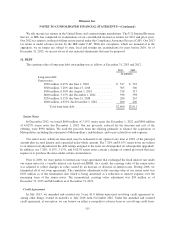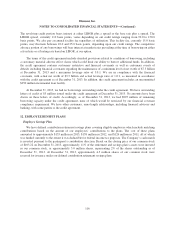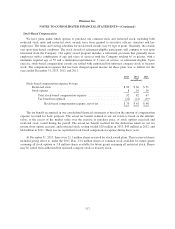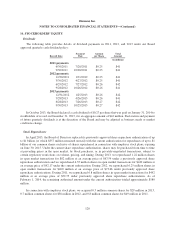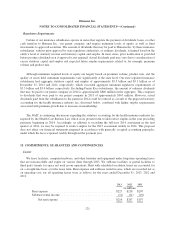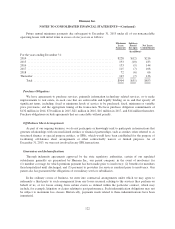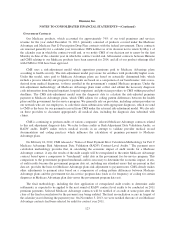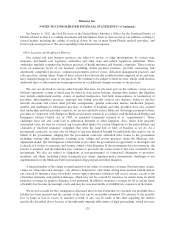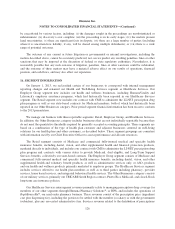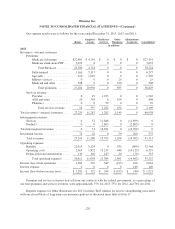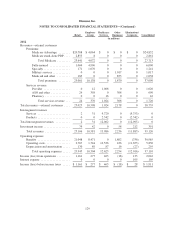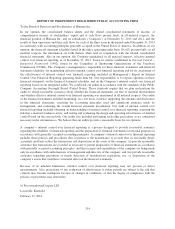Humana 2013 Annual Report Download - page 135
Download and view the complete annual report
Please find page 135 of the 2013 Humana annual report below. You can navigate through the pages in the report by either clicking on the pages listed below, or by using the keyword search tool below to find specific information within the annual report.Humana Inc.
NOTES TO CONSOLIDATED FINANCIAL STATEMENTS—(Continued)
On January 6, 2012, the Civil Division of the United States Attorney’s Office for the Southern District of
Florida advised us that it is seeking documents and information from us and several of our affiliates relating to
several matters including the coding of medical claims by one or more South Florida medical providers, and
loans to physician practices. We are responding to the information requests.
Other Lawsuits and Regulatory Matters
Our current and past business practices are subject to review or other investigations by various state
insurance and health care regulatory authorities and other state and federal regulatory authorities. These
authorities regularly scrutinize the business practices of health insurance and benefits companies. These reviews
focus on numerous facets of our business, including claims payment practices, provider contracting, risk
adjustment, competitive practices, commission payments, privacy issues, utilization management practices, and
sales practices, among others. Some of these reviews have historically resulted in fines imposed on us and some
have required changes to some of our practices. We continue to be subject to these reviews, which could result in
additional fines or other sanctions being imposed on us or additional changes in some of our practices.
We also are involved in various other lawsuits that arise, for the most part, in the ordinary course of our
business operations, certain of which may be styled as class-action lawsuits. Among other matters, this litigation
may include employment matters, claims of medical malpractice, bad faith, nonacceptance or termination of
providers, anticompetitive practices, improper rate setting, provider contract rate disputes, failure to disclose
network discounts and various other provider arrangements, general contractual matters, intellectual property
matters, and challenges to subrogation practices. A number of hospitals and other providers have also asserted
that, under their network provider contracts, we are not entitled to reduce Medicare Advantage payments to these
providers in connection with changes in Medicare payment systems in accordance with the Balanced Budget and
Emergency Deficit Control Act of 1985, as amended (commonly referred to as “sequestration”). Those
challenges have led and could lead to arbitration demands or other litigation. Also, under state guaranty
assessment laws, we may be assessed (up to prescribed limits) for certain obligations to the policyholders and
claimants of insolvent insurance companies that write the same line or lines of business as we do. As a
government contractor, we may also be subject to qui tam litigation brought by individuals who seek to sue on
behalf of the government, alleging that the government contractor submitted false claims to the government
including, among other allegations, resulting from coding and review practices under the Medicare risk-
adjustment model. Qui tam litigation is filed under seal to allow the government an opportunity to investigate and
to decide if it wishes to intervene and assume control of the litigation. If the government does not intervene, the
lawsuit is unsealed, and the individual may continue to prosecute the action on his or her own, on behalf of the
government. We also are subject to allegations of non-performance of contractual obligations to providers,
members, and others, including failure to properly pay claims, improper policy terminations, challenges to our
implementation of the Medicare Part D prescription drug program and other litigation.
A limited number of the claims asserted against us are subject to insurance coverage. Personal injury claims,
claims for extracontractual damages, care delivery malpractice, and claims arising from medical benefit denials
are covered by insurance from our wholly owned captive insurance subsidiary and excess carriers, except to the
extent that claimants seek punitive damages, which may not be covered by insurance in certain states in which
insurance coverage for punitive damages is not permitted. In addition, insurance coverage for all or certain forms
of liability has become increasingly costly and may become unavailable or prohibitively expensive in the future.
We record accruals for the contingencies discussed above to the extent that we conclude it is probable that a
liability has been incurred and the amount of the loss can be reasonably estimated. No estimate of the possible
loss or range of loss in excess of amounts accrued, if any, can be made at this time regarding the matters
specifically described above because of the inherently unpredictable nature of legal proceedings, which also may
125


